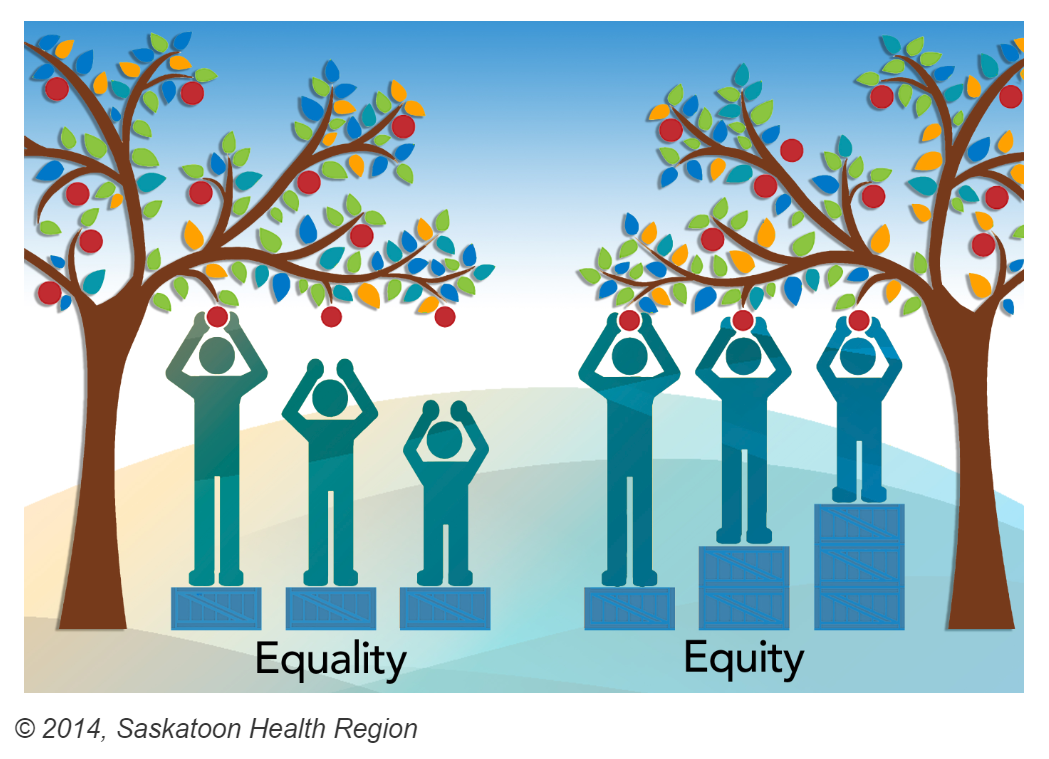Equality versus Equity – What does it all mean?
At the very basic level, the idea of equality is that everyone receives the same or equal. Equity, on the other hand, aims to make all things fair. Take the image as an example. Here we see that “equality” means all the people have the same size of box to stand on, but that does not mean they can all reach the fruit in the tree. When there is “equity”, everyone has the size of box they need, so each has a fair chance to reach the fruit.
Equity is critical in all areas of sustainability, whether you are considering the three Es (environment, economic, and ethical) or the triple bottom line (people, profit, planet). Many facets of equity exist, for example, environmental justice and social justice are two components of equity and they are intertwined. Environmental justice must be addressed in land use plans, policies, and actions. No longer is placing a large power plant next to a low-income neighborhood easily tolerated. Social justice includes providing people fair treatment and unbiased share of social, environmental, and economic benefits.
Awareness of climate equity is not new. The concept of climate equity has been in the forefront for more than two decades on an international and national climate policy level.[1] The International Council for Local Environmental Initiatives (ICLEI), also known as Local Governments for Sustainability (an organization Lotus has a long-standing relationship with), has been addressing the issue of climate equity since the 1990s in terms of greenhouse gas emissions management.
The good news is that equity issues are addressed frequently by local governments as initiatives involving sustainability are developed and implemented. As an example, the City of Portland and Multnomah County have made climate equity a central focus of their Climate Action Plan and acknowledge that climate change impacts some people more than others (to read more, Climate Action Through Equity can be found here).
To take this concept a little further, we turn to the Urban Sustainability Directors Network (USDN), and their September 2014 report, “Equity in Sustainability, An Equity Scan of Local Government Sustainability Programs”. In the report, USDN expands upon the idea of equality versus equity in terms of sustainability and the idea that equity is a core component of sustainability. USDN sheds light on the fact that equity in sustainability needs to be incorporated into procedures, distribution of benefits and burdens, structural accountability, and generational impact. (For more information, the report can be found here. )
Like many other well-respected organizations and experts on the matter, Lotus believes equity needs to be an integral part of all our work. We strive to weave this into our projects through stakeholder engagement, outreach, and education with the underlying firm belief that education and information leads to action. Policies, initiatives, strategy development, etc. should be approached with an authentic lens of equity if we are going to be successful at taking a stand to curb the impacts of climate change and trying to course-correct our trajectory. By doing this, it puts us on a path toward a sustainable future and to ensure equitable access to the benefits a sustainable future presents for all generations.
[1] World Resources Institute. 2019. “Climate Equity.” https://www.wri.org/our-work/project/climate-equity.

